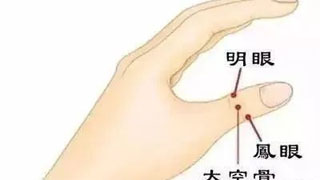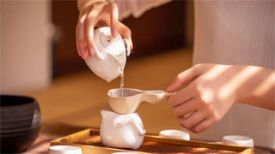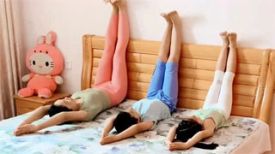
A wonderful remedy for relieving eye fatigue: massage the Mingyan acupoint
Getting older. Easy to presbyopia, try massaging the Mingyan acupoint to ensure that you will be hearing and seeing clearly. People who cannot work without computers need this wonderful recipe! If we often feel eye fatigue but it is not time for sleep, we can use acupoint massage to relieve the symptoms of eye fatigue.There are three adjacent acupoints on our thumb, namely Mingyan, Fengyan, and Dakong Gu (as shown in the above picture). Mingyan and Fengyan can improve eye fatigue and acute conjunctivitis, while Dakong bone can improve all symptoms related to the eyes. People who are prone to eye fatigue should stimulate these three acupoints twice a day.
The method of stimulation is to clamp with the thumb and index finger of the other hand, and apply stimulation to the three acupoints with the fingernails of the thumb, as long as the pressure is slightly felt to the pain level.
This is a simple massage method that can be operated by oneself at any time during work breaks or waiting for a car. People who experience eye fatigue often struggle to fall asleep. If the above stimuli are applied to eliminate eye fatigue, they can easily fall asleep. The above methods can also inhibit age-related cataracts.
Eight methods of raising eyes to make them brighter
1. Cherish your eyes: Do not use your eyes excessively. Regardless of gender, age, or age, pay attention to using your eyes sparingly. Generally, take a break of 5-10 minutes after about 40-60 minutes.
2. Iron your eyes: Every morning before waking up or going to bed, sit or stand upright, close your eyes, and quickly rub and rub your palms. After about half a minute, you will feel hot and hot, and then quickly press and stroke your palms on your eyes. When the heat is not obvious, try again as usual, repeating this process 14 times a day. This method has the effect of unblocking meridians, activating collaterals, and improving blood circulation.
3. Eye movement: Stand 2-3 meters outside the window naturally, with both eyes fixed on the 4 corners of the window in sequence, alternating clockwise and counterclockwise directions for a total of 7-14 times. This method can relax the muscles, activate the meridians, and improve vision.
4. Bathing eyes: Fumigate both eyes with hot water, a hot towel, or steam, 1-2 times a day, for 15-20 minutes each time. You can also use a traditional Chinese medicine bath, which involves boiling traditional Chinese medicines such as chrysanthemums, clear leaves, mulberry leaves, and bamboo leaves into water. While they are hot, steam your eyes first, wait for the water temperature, and then wash your eyes with the medicinal solution. Over time, it can clear heat, reduce inflammation, and improve eyesight.
5. Eye care: Pay attention to the selection and combination of diet in daily life, such as the combination of coarse and fine grains, meat and vegetable dishes, etc. In addition, it is important to eat more vegetables and fruits, pay attention to supplementing vitamins and trace elements, and eat some seaweed, carrots, celery, animal liver, etc. appropriately.
6. Momu: Close your eyes, press your eyes with the middle and index fingers of both hands, and apply pressure rhythmically (to avoid discomfort), with slight rotational movements. This method is most suitable for the elderly, especially for patients with glaucoma. But people who suffer from eye diseases or have undergone eye surgery must follow the guidance of a doctor and not use excessive force.
7. Jimu: In the morning, choose an open and fresh air place to stand upright naturally, and first look at a distant target, such as a tree top, tower tip, or mountain peak, with both eyes facing straight. At this point, try to relax your eyes as much as possible. After 1-2 minutes, gradually move your gaze closer until you are about 1 foot in front of your eyes. Focus for about 1 minute, and then move your gaze from near to far to the original target.
8. Eye protection: Do not stay in strong sunlight or lighting for a long time, let alone read books or newspapers in strong light, and the brightness of the TV should not be too strong. If traveling in summer, wear suitable sunglasses. In addition, patients with various refractive errors should wear appropriate glasses, etc.
Kind reminder: Information is for reference and learning only, and is not used as a basis for medical diagnosis. If necessary, please use under the guidance of a physician.


